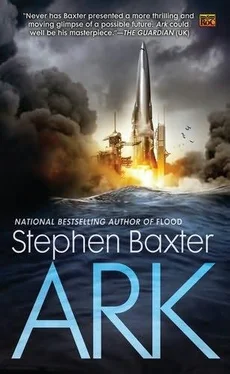Jeb the farmer’s son asked, “So you think we really can grow crops here? It’s all so strange.”
“Hell, yes,” said Wilson, and he waved a gloved hand. “In the long term there are all sorts of advantages to a world like this. That sun’s never going to move from where it is in the sky.”
“It’s always morning here,” Helen murmured.
“Always morning. We can set up mirrors to concentrate the light. Later, when we get back off planet, we can throw up strings of orbital mirrors to focus the light on our farms, even start lighting up the far side and melt that damn ice cap.”
Helen smiled behind her mask. “One step at a time, Wilson.”
“I think I smell sulfur,” Jeb said.
“Volcano air,” Wilson said.
Helen took another step, toward the base of the ramp. It had cut a shallow groove in the ice, which was gritty and littered with small rocks and a thin ash, maybe from some volcanic event.
On impulse Jeb kneeled down, cautiously, and set little Sapphire down on the ramp. Sapphire, the youngest of the crew, too young to know she had not yet learned to walk, tried to stand up, and fell flat on her backside. But she just rolled over and got up on her hands and knees and began to crawl, a bit unsteadily, but purposefully.
And she crawled right off the edge of the ramp and onto the ice of Earth III. She squealed at the cold, and then poked her gloved finger into the groove the ramp had made. Helen felt regret, a deep, visceral stab, that her own children couldn’t come running down this ramp and join her.
“Look up,” Wilson said.
Helen straightened up. There, crossing the tall red sky, was a star, ruby-bright, tracking steadily toward the M-sun. It was Halivah, the only moon of Earth III. And as Helen watched, straining her eyes, the sky puckered, and the Ark was gone.












